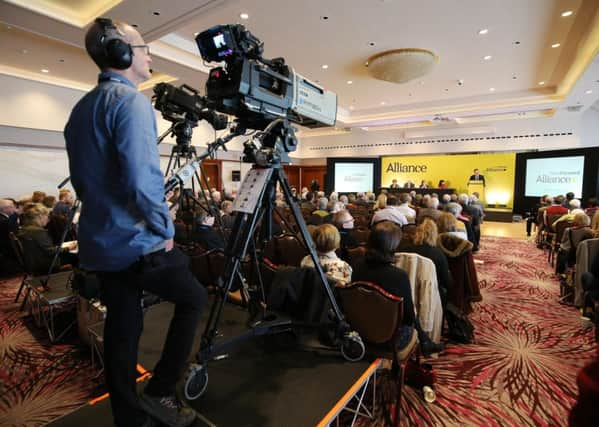Ben Lowry: Brexit throws NI's future up in the air and where it all lands will be telling


During the chat, I asked the Alliance members in the room whether or not Brexit had made them more receptive to a united Ireland.
There were 30 or 40 people present, of whom around half put up their hands.
Advertisement
Hide AdAdvertisement
Hide AdThe political centre ground in Northern Ireland, the 10+% who vote for non tribal parties, principally Alliance and Greens, were emphatically opposed to a UK departure from the European Union.
If that straw poll reflected wider thinking among such voters, then there are two almost opposite ways of looking at the finding.
The first is that it spells deep trouble for Northern Ireland’s future in the UK. Until recently a large minority of nationalists consistently said that they would vote to maintain the Union in any border poll.
The centre ground, however, was overwhelmingly pro UK, 95+%.
Advertisement
Hide AdAdvertisement
Hide AdIn the late 1980s, in my teens, I asked a councillor and long established member of Alliance what he thought about re-partition as a possible future political solution.
“No,” he said, “that would be the beginning of the slippery slope.”
Such thinking seemed common in that generation of people who founded Alliance in 1970.
It meant that many nationalists dismissed the party as unionist, which in one respect it firmly was (as in pro Union) but in another it passionately wasn’t (capital ‘U’ Unionist, pro Orangeism, etc).
Advertisement
Hide AdAdvertisement
Hide AdThe opposite way of looking at my Alliance straw poll from last year is that Irish unity is so far off the agenda of most people in Northern Ireland that even a party that is dedicated to the EU, like its sister party, the Lib Dems, is still 50% completely disinclined to leave the UK, post the ‘disaster’ of Brexit.
My question of the room was ‘how many people were more receptive to Irish unity?’ People who might say yes might also pull away from it if it comes to the crunch.
An obvious risk for unionists is that in a border poll a tranche people, mostly from a nationalist background, but also people who consider themselves ‘neithers’ (nationalist or unionist), will vote unity as an aspiration, not thinking it will happen, and not realising it actually might (as Scottish independence nearly did, and Brexit actually did).
Brexit has thrown everything in the air, and has enraged some nationalist and centrist voters hitherto content with the status quo.
Advertisement
Hide AdAdvertisement
Hide AdIt is hard to see where it will all land. I think a border poll held five years ago would have been 70-30 in favour of Northern Ireland staying in the UK, perhaps 75-25. Things felt settled here as they did in Scoland, with polls on support for independence showing such low levels (circa 30%) that few pundits thought it would happen,
I wrote an article then advocating an NI border poll if unionists could secure agreement from nationalists that an emphatic vote for the Union would put the matter off the table for a generation.
Everything has changed since then, from Scotland to Brexit to the rise of outsiders like Jeremy Corbyn and Donald Trump to the refugee crisis to the meltdown at Stormont.
Support for unity has risen since Brexit. The imponderable is whether it has risen 4% or closer to 20%.
Advertisement
Hide AdAdvertisement
Hide AdThe Belfast Agreement says that if a border poll is held, another one cannot be called within seven years. This was foolish – it should have been at least 10 or 12 years.
It in effect means that a remotely close vote, even 60-40 to stay in the UK, would lead to republicans insisting on a poll every seven years, which would leave the Province on a permanent electoral ‘constitutional war’ footing. Seven year border polls would be akin to some electoral cycles (US senators face re-election each six years).
Contrast that with Quebec: a huge 40.4% support for separation from Canada in 1980 did not lead to another referendum until 1995, when it rose to a remarkable 49.4%, within a whisker of victory.
Yet far from ‘one more push’ after that, it has been off the agenda for almost a quarter of century.
Advertisement
Hide AdAdvertisement
Hide AdA big challenge for supporters of unity is the inertia with which many casual voters approach things.
It might just be that quite aside from the money, hundreds of thousands of people in Northern Ireland who don’t think much about the constitutional position will still think the UK is comfortable state in which to live, even post Brexit.
That they like having British passports, voting in Westminster elections, watching the BBC, being part of the same major nation state as London.
Or it might be that enough such people begin to think of the EU as being the comfortable place.
Advertisement
Hide AdAdvertisement
Hide AdIt would not surprise me if the UK had broken up within 30 years, but nor would it surprise me if it was thriving 130 years from now.
But one thing can be said with confidence now. If post Brexit support for unity does not rise much, nationalists face the reality of a long Northern Ireland.
Or if support for unity soars, unionists have made a catastrophic mistake backing Brexit.
• Ben Lowry (@BenLowry2) is News Letter deputy editor